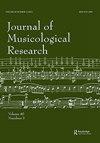音乐学评论推特
IF 0.4
2区 艺术学
0 MUSIC
引用次数: 1
摘要
Lily Hirsch(韩):作为《音乐学研究杂志》的评论编辑,我很高兴能够为这本杂志尝试一些全新的东西,也可能是为整个领域:通过专家之间的非正式对话来进行“音乐学评论推特”。这个想法的灵感来自于专栏作家盖尔·柯林斯和布雷特·斯蒂芬斯每周在纽约时报上发表的“对话”。在这首个音乐学“对话”中,我想把重点放在Twitter上,因为这个平台与激进主义有着深刻的联系,莎拉·j·杰克逊、莫亚·贝利和布鲁克·福柯·威尔斯在《#Hashtag activism》一书中对这个话题进行了精彩的探讨。尽管这个社交媒体网站名声不好,但Twitter给我的印象是,它是一个潜在的平等主义空间,为所有级别(甚至没有级别)的音乐学家提供了联系、分享研究成果和发现与研究相关问题的机会。作为一名独立学者,这种潜力长期以来一直吸引着我,在疫情封锁期间更是如此,当时即使有能力的人也无法参加会议。然而,很明显,只有当一个人以某种方式使用Twitter时,这些积极因素才会存在。毕竟,陷阱很多:Twitter上到处都是喷子,而且很容易陷入公开对抗和争议。考虑到这一点,我联系了三位在Twitter上有影响力的资深音乐学者,希望他们能对Twitter的最佳实践提供一些启示,无论是对我这样的音乐界人士还是新近加入Twitter的人,以及那些想加入这个网络的人。我相信他们的对话对经验丰富的Twitter用户也很有用。下面是我的开场问题,分别是马修·d·莫里森(@DrMaDMo)、罗宾·詹姆斯(@doctaj)和伊玛尼·莫斯利(@imanimosley):本文章由计算机程序翻译,如有差异,请以英文原文为准。
Review of Musicology Twitter
Lily Hirsch (LH): As Reviews Editor of the Journal of Musicological Research, I am excited to be trying something brand new for this journal, and possibly for the field as a whole: a “Review of Musicology Twitter” that takes place through an informal conversation among experts. The inspiration for this idea comes from “The Conversation” between columnists Gail Collins and Bret Stephens published weekly in the New York Times. For this inaugural musicological “conversation,” I wanted to focus on Twitter because of the platform’s deep connections to activism, a topic explored brilliantly in the book #Hashtag Activism by Sarah J. Jackson, Moya Bailey, and Brooke Foucault Welles. Despite the social media site’s well-earned negative reputation, Twitter has struck me as a potentially egalitarian space, offering musicologist of all ranks (and no rank at all) a chance to connect, to share research, and to discover research-related questions. As an independent scholar, this potential has long been attractive to me, even more so during the Covid lockdown, when travel prevented even those with means from attending conferences. It is clear, however, that these positives only exist if a person engages with Twitter in certain ways. After all, the pitfalls are many: Twitter trolls are everywhere and it is surprisingly easy to become mired in public confrontations and controversies. With this in mind, I reached out to three Twitter veterans, music scholars who have a visible and influential presence on Twitter, hoping they might shed some light on Twitter best practices, both for those like me, in music and newly on Twitter, and for those thinking about joining this network. I am confident their conversation will be useful for more seasoned Twitter users as well. Here, then, are my kickoff questions, addressed to Matthew D. Morrison (@DrMaDMo), Robin James (@doctaj), and Imani Mosley (@imanimosley):
求助全文
通过发布文献求助,成功后即可免费获取论文全文。
去求助
来源期刊
CiteScore
0.30
自引率
0.00%
发文量
17
期刊介绍:
The Journal of Musicological Research publishes original articles on all aspects of the discipline of music: historical musicology, style and repertory studies, music theory, ethnomusicology, music education, organology, and interdisciplinary studies. Because contemporary music scholarship addresses critical and analytical issues from a multiplicity of viewpoints, the Journal of Musicological Research seeks to present studies from all perspectives, using the full spectrum of methodologies. This variety makes the Journal a place where scholarly approaches can coexist, in all their harmony and occasional discord, and one that is not allied with any particular school or viewpoint.

 求助内容:
求助内容: 应助结果提醒方式:
应助结果提醒方式:


